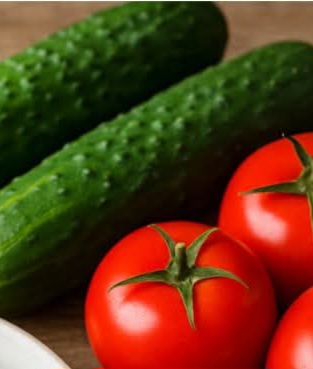Cucumbers are a refreshing, hydrating addition to any meal, loved for their crisp texture and mild flavor. But did you know that combining cucumbers with certain foods might not be the best choice for your digestion or overall health? While cucumbers are nutritious, some food pairings could lead to discomfort or reduced nutrient absorption. Let’s explore which foods to avoid eating with cucumbers and why, so you can enjoy this veggie in a way that supports your wellness. Keep reading to learn how to make the most of your meals!
Why Food Pairings Matter for Your HealtThe foods you eat together can impact how your body digests and absorbs nutrients. According to experts at Harvard Health, certain combinations may cause bloating, reduce nutrient uptake, or strain your digestive system. Cucumbers, which are over 95% water, are generally easy to digest, but pairing them with specific foods can sometimes lead to issues. Below, we’ll dive into three foods to avoid combining with cucumbers and explain why these pairings might cause problems.Dairy Products: A Recipe for Digestive DiscomfortCucumbers and dairy products, like yogurt or cheese, might seem like a healthy combo, but they can sometimes upset your stomach.Why it’s a problem: Cucumbers are cooling and water-rich, while dairy is heavier and slower to digest. According to a 2020 study in the Journal of Food Science, combining water-heavy foods with dairy can dilute stomach acids, slowing digestion and potentially causing bloating or gas.What to watch for: Eating cucumber with yogurt (a popular combo in some dishes) may lead to discomfort, especially if you’re lactose intolerant or have a sensitive stomach.Better choice: Pair cucumbers with light, non-dairy foods like leafy greens or lean proteins for a meal that’s easier on your system.If you love creamy textures, try a dairy-free alternative, like avocado, which complements cucumbers without the digestive clash.High-Sugar Fruits: A Clash of Digestion SpeedsMixing cucumbers with high-sugar fruits, such as melons or mangoes, can throw off your digestive rhythm.Why it’s a problem: Cucumbers digest quickly due to their high water content, while sugary fruits take longer to break down. A 2019 article from the Cleveland Clinic notes that combining fast- and slow-digesting foods can lead to fermentation in the gut, causing bloating or cramps.What to watch for: Salads or smoothies with cucumbers and sweet fruits might taste great but could leave you feeling sluggish or gassy.Better choice: Enjoy cucumbers in savory dishes, like salads with tomatoes and herbs, and save sweet fruits for a separate snack. This allows your body to process each food at its own pacePro tip: If you’re craving a refreshing mix, pair cucumbers with low-sugar fruits like berries for a gentler combo.Starchy Foods: A Nutrient Absorption IssueCombining cucumbers with starchy foods, like potatoes or bread, may not be the best for nutrient absorption.Why it’s a problem: Starches require more stomach acid and time to digest compared to cucumbers. According to WebMD, eating water-rich foods with starches can dilute digestive enzymes, potentially reducing how well your body absorbs nutrients like vitamins and minerals.What to watch for: A cucumber and potato salad or a cucumber sandwich might seem harmless, but it could lead to mild digestive issues or leave you feeling less energized.Better choice: Pair cucumbers with non-starchy vegetables, like bell peppers or carrots, to keep your meal light and nutrient-packed.For a satisfying dish, try a cucumber and quinoa salad, as quinoa is a lighter, protein-rich alternative to heavy starches.Tips to Enjoy Cucumbers Safely and DeliciouslyCucumbers are a fantastic addition to a healthy diet, and with a few mindful choices, you can enjoy them without worry. Here are some practical tips to make the most of this versatile veggie:Eat cucumbers solo or with compatible foods: Stick to pairings like tomatoes, herbs, or lean proteins for easy digestion.Time your meals: If you want to eat dairy, starches, or sugary fruits, wait at least an hour after eating cucumbers to give your stomach time to process.Stay hydrated: Cucumbers are hydrating, so pair them with water or herbal tea to support digestion.Listen to your body: Everyone’s digestive system is unique. If a certain combo causes discomfort, try adjusting your meals and see what feels best.Share these tips with a friend who loves cucumbers as much as you do!How to Spot Digestive Issues and What to DoIf you’ve eaten cucumbers with one of these foods and feel off, don’t panic. Common signs of digestive discomfort include bloating, gas, or a heavy feeling in your stomach. The Mayo Clinic suggests these steps to ease mild issues:Sip warm water or ginger tea to soothe your stomach.Take a short walk to stimulate digestion.Avoid lying down right after eating to prevent acid reflux.If discomfort persists or worsens, reach out to a healthcare provider to rule out underlying conditions like food sensitivities. Most of the time, adjusting your food pairings can make a big difference.Making Smart Food Choices for Long-Term WellnessUnderstanding how foods work together is a simple way to boost your health. Cucumbers are packed with benefits—hydration, fiber, and vitamins like K and C—making them a great choice for salads, snacks, or even infused water. By avoiding pairings with dairy, high-sugar fruits, and starches, you can enjoy cucumbers while keeping your digestion happy and your nutrient absorption on point.Explore more health tips on our site to keep your meals balanced and your body feeling great. Have a favorite cucumber recipe? Drop it in the comments below—we’d love to hear it!Disclaimer: This article is for informational purposes only and does not substitute professional medical advice. Consult your doctor before making health changes.Love Cucumbers? Never Eat Them with These Foods
